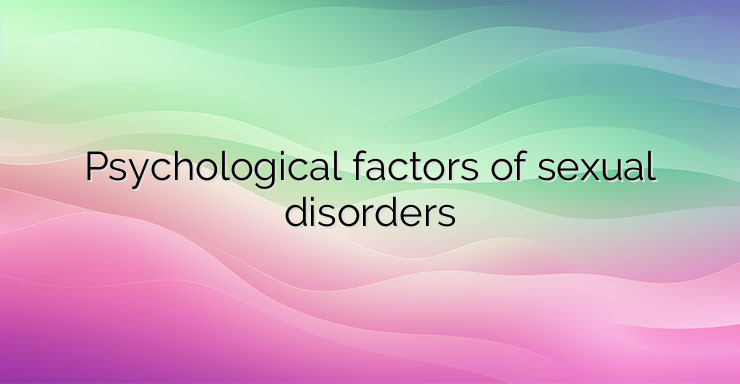A large percentage of sexual disorders are rooted in psychological rather than organic/biological factors, especially when it comes to individuals under the age of 50. First of all, it is important to mention the types of sexual disorders in men and women. A sexual disorder of psychological origin can occur at the level of sexual desire. Sexual desire disorder is the reduced or complete lack of mental (eg fantasy) and emotional mood (eg passion) of a man or woman involved in any sexual act. In fact, sexual aversion can often occur, where the person completely avoids any sexual “calls” or stimuli from their partner. Sexual disorder can occur at the level of arousal. This is related to the inability to obtain or maintain an erection, which is observed in men and the lack of vaginal moistening in women. Finally, a sexual disorder of psychological origin can develop at the orgasmic level. This includes premature and inhibited ejaculation in men and lack of orgasm in women. An important psychological factor in sexual disorders is the family and the wider environment in which the man or woman grew up. Factors such as strict parenting e.g. “Sex is immoral and dangerous”, insufficient and false information about sex e.g. “A man should always be ready for sex,” disturbed parental relationships such as lack of emotional and physical contact, and early traumatic experiences such as child sexual abuse are important early psychological factors that appear to be blamed for the development of psychosexual problems in adulthood. age. Many times, sexual problems reflect deeper conflicts that exist in a relationship/marriage. That is, erectile dysfunction can be the result of a lack of communication and intense quarrels between the couple or the absence of sexual desire between the partners. In fact, many times if there is an improvement in the couple’s overall relationship, normal sexual function is restored at the same time. Stress is one of the most powerful factors in causing and maintaining psychosexual disorder. Stress produces substances in the blood (adrenaline, norepinephrine) that reach the penis in a few seconds and cause the arteries to constrict and the veins to dilate, causing the penis to relax. For example, a single event of not having or maintaining an erection can cause intense anxiety or fear of failure in a man. Performance anxiety is related to the agony of getting an erection, maintaining an erection, the ability to orgasm, and the satisfaction of your partner. However, stress brings more stress, so the person cannot function sexually either at the level of desire, arousal, or orgasm. Depression is another important psychological factor in sexual dysfunction. When a person suffers from depression, they have low levels of energy, mood and pleasure.Depression is inextricably linked to the lack of sexual desire due to the depressed person’s lack of pleasure and mood. Finally, the media has played a key role in people’s sex lives in recent decades. For example, the media (magazines, television) presents the “perfect woman” who is always provocative, feminine, beautiful, fit and ready to answer a call, creating a false role model. Because of this, many women feel disadvantaged when they cannot meet this “ideal” standard, resulting in them feeling uncomfortable with their bodies and their partners. The result is that they are unable to enjoy intercourse and feel comfortable with their sexuality. Thus, they are trapped in a vicious circle of anxiety, depression and low self-esteem, which can even create some kind of chronic sexual disorder.


Leave a Reply